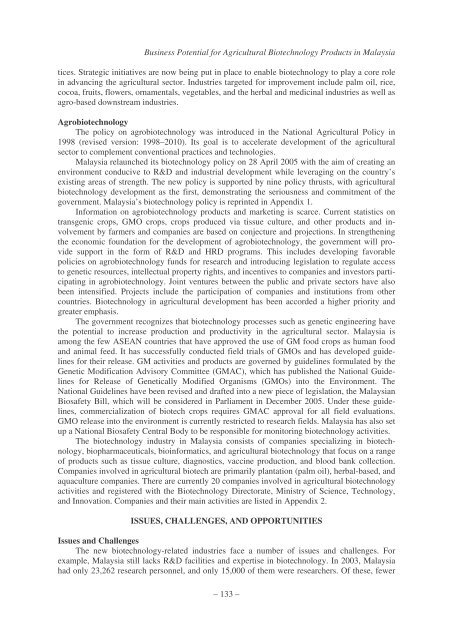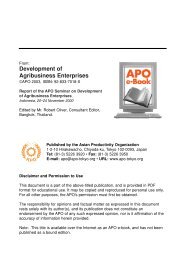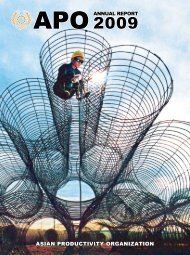Business Potential for Agricultural Biotechnology - Asian Productivity ...
Business Potential for Agricultural Biotechnology - Asian Productivity ...
Business Potential for Agricultural Biotechnology - Asian Productivity ...
You also want an ePaper? Increase the reach of your titles
YUMPU automatically turns print PDFs into web optimized ePapers that Google loves.
<strong>Business</strong> <strong>Potential</strong> <strong>for</strong> <strong>Agricultural</strong> <strong>Biotechnology</strong> Products in Malaysia<br />
tices. Strategic initiatives are now being put in place to enable biotechnology to play a core role<br />
in advancing the agricultural sector. Industries targeted <strong>for</strong> improvement include palm oil, rice,<br />
cocoa, fruits, flowers, ornamentals, vegetables, and the herbal and medicinal industries as well as<br />
agro-based downstream industries.<br />
Agrobiotechnology<br />
The policy on agrobiotechnology was introduced in the National <strong>Agricultural</strong> Policy in<br />
1998 (revised version: 1998–2010). Its goal is to accelerate development of the agricultural<br />
sector to complement conventional practices and technologies.<br />
Malaysia relaunched its biotechnology policy on 28 April 2005 with the aim of creating an<br />
environment conducive to R&D and industrial development while leveraging on the country’s<br />
existing areas of strength. The new policy is supported by nine policy thrusts, with agricultural<br />
biotechnology development as the first, demonstrating the seriousness and commitment of the<br />
government. Malaysia’s biotechnology policy is reprinted in Appendix 1.<br />
In<strong>for</strong>mation on agrobiotechnology products and marketing is scarce. Current statistics on<br />
transgenic crops, GMO crops, crops produced via tissue culture, and other products and involvement<br />
by farmers and companies are based on conjecture and projections. In strengthening<br />
the economic foundation <strong>for</strong> the development of agrobiotechnology, the government will provide<br />
support in the <strong>for</strong>m of R&D and HRD programs. This includes developing favorable<br />
policies on agrobiotechnology funds <strong>for</strong> research and introducing legislation to regulate access<br />
to genetic resources, intellectual property rights, and incentives to companies and investors participating<br />
in agrobiotechnology. Joint ventures between the public and private sectors have also<br />
been intensified. Projects include the participation of companies and institutions from other<br />
countries. <strong>Biotechnology</strong> in agricultural development has been accorded a higher priority and<br />
greater emphasis.<br />
The government recognizes that biotechnology processes such as genetic engineering have<br />
the potential to increase production and productivity in the agricultural sector. Malaysia is<br />
among the few ASEAN countries that have approved the use of GM food crops as human food<br />
and animal feed. It has successfully conducted field trials of GMOs and has developed guidelines<br />
<strong>for</strong> their release. GM activities and products are governed by guidelines <strong>for</strong>mulated by the<br />
Genetic Modification Advisory Committee (GMAC), which has published the National Guidelines<br />
<strong>for</strong> Release of Genetically Modified Organisms (GMOs) into the Environment. The<br />
National Guidelines have been revised and drafted into a new piece of legislation, the Malaysian<br />
Biosafety Bill, which will be considered in Parliament in December 2005. Under these guidelines,<br />
commercialization of biotech crops requires GMAC approval <strong>for</strong> all field evaluations.<br />
GMO release into the environment is currently restricted to research fields. Malaysia has also set<br />
up a National Biosafety Central Body to be responsible <strong>for</strong> monitoring biotechnology activities.<br />
The biotechnology industry in Malaysia consists of companies specializing in biotechnology,<br />
biopharmaceuticals, bioin<strong>for</strong>matics, and agricultural biotechnology that focus on a range<br />
of products such as tissue culture, diagnostics, vaccine production, and blood bank collection.<br />
Companies involved in agricultural biotech are primarily plantation (palm oil), herbal-based, and<br />
aquaculture companies. There are currently 20 companies involved in agricultural biotechnology<br />
activities and registered with the <strong>Biotechnology</strong> Directorate, Ministry of Science, Technology,<br />
and Innovation. Companies and their main activities are listed in Appendix 2.<br />
ISSUES, CHALLENGES, AND OPPORTUNITIES<br />
Issues and Challenges<br />
The new biotechnology-related industries face a number of issues and challenges. For<br />
example, Malaysia still lacks R&D facilities and expertise in biotechnology. In 2003, Malaysia<br />
had only 23,262 research personnel, and only 15,000 of them were researchers. Of these, fewer<br />
– 133 –
















